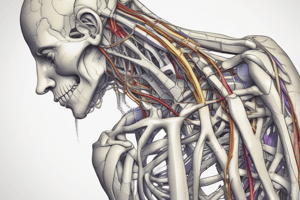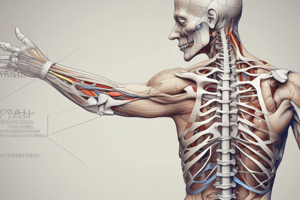Podcast
Questions and Answers
What is a brachial plexus injury?
What is a brachial plexus injury?
C5-T1 resulting in whole UE involvement
What is the purpose of an Erb's palsy splint?
What is the purpose of an Erb's palsy splint?
Elbow lock splint stabilizes the elbow to enable positioning of the hand.
What type of splint is used for radial nerve palsy?
What type of splint is used for radial nerve palsy?
Dynamic extension splint
What does a dorsal blocking splint with wrist at 30 degrees assist with?
What does a dorsal blocking splint with wrist at 30 degrees assist with?
What is the function of a MCP flexion blocking splint?
What is the function of a MCP flexion blocking splint?
What is a tenodesis splint used for?
What is a tenodesis splint used for?
What is the purpose of a thumb spica splint?
What is the purpose of a thumb spica splint?
What type of splint is used to prevent hyperextension of the PIP joint?
What type of splint is used to prevent hyperextension of the PIP joint?
What is a hand-based thumb splint used for?
What is a hand-based thumb splint used for?
What type of splint is a resting splint?
What type of splint is a resting splint?
What does an extension splint assist with in Dupuytren's disease?
What does an extension splint assist with in Dupuytren's disease?
Which of the following is a feature of a balanced forearm orthosis (BFO)?
Which of the following is a feature of a balanced forearm orthosis (BFO)?
A wrist cock-up splint is used to position the wrist in __________.
A wrist cock-up splint is used to position the wrist in __________.
A night resting splint addresses functional use of the hand.
A night resting splint addresses functional use of the hand.
What kind of treatment is recommended for lateral/medial epicondylitis?
What kind of treatment is recommended for lateral/medial epicondylitis?
Study Notes
Brachial Plexus Injuries
- Brachial plexus (C5-T1) injuries lead to whole upper extremity involvement.
- Flail arm splint provides stability at the shoulder and elbow for functional hand positioning.
Erb's Palsy
- Injury to the 5th and 6th brachial plexus roots.
- Elbow lock splint stabilizes the elbow, allowing hand positioning closer to or away from the body.
Radial Nerve Palsy
- Dynamic extension splint is used to assist with arm function.
Median Nerve Injury
- Dorsal blocking splint with wrist at 30 degrees is necessary, includes 90 degrees elbow positioning for high lesions.
- Features include a C-bar and opponens to support hand function.
Ulnar Nerve Injury
- MCP flexion blocking splint is designed to prevent hyperextension of the fingers.
Spinal Cord Injury (C6-C7)
- Tenodesis splint is utilized to facilitate grasp function through wrist positioning.
DeQuervain's Disease
- A thumb spica splint is used, encompassing the wrist while leaving the IP joint free.
Swan Neck Deformity
- Silver rings or buttonhole splint is applied to prevent hyperextension of the PIP joint.
Boutonniere Deformity
- Silver rings or a dynamic PIP extension splint helps avoid flexion of the PIP joint.
Skier's Thumb
- Hand-based thumb splint supports the thumb to allow for healing.
CMC Arthritis
- A hand-based thumb splint, functional (C-shaped) or safe splint, is selected based on the stage of arthritis.
Flaccidity
- Resting splint is employed to support the affected limbs.
Spasticity
- Spasticity splint, featuring fingers and thumb in abduction, or a cone splint is used for management.
Muscle Weakness
- Balanced forearm orthosis (BFO) and deltoid sling/overhead suspension slings assist individuals with conditions like ALS, SCI, or Guillain-Barre.
- These mount to wheelchairs and require shoulder or trunk movement.
Carpal Tunnel Syndrome
- A wrist cock-up splint in a neutral position with minimal ulnar deviation is prescribed; wrist flexion activities should be avoided.
Pronator Teres Syndrome
- An elbow splint at 90 degrees with the forearm in a neutral position is implemented for treatment.
Cubital Tunnel Syndrome
- Elbow splint at 30 degrees prevents extreme flexion, particularly during sleep.
Kleinert Protocol
- Involves active digit extension with passive flexion using rubber band traction; a dorsal block splint is utilized.
Duran Protocol
- Focuses on passive flexion and extension of digits, also using a dorsal block splint.
Long Opponens Splint
- Prevents both radial and ulnar deviations of the hand.
Bilateral Soft Elbow Splints
- Fix elbows at 20-30 degrees of flexion to maintain position.
Wrist Cock-Up Splint
- Allows full MCP flexion while maintaining the wrist and hand in a functional position; beneficial for acute rheumatoid arthritis and carpal tunnel syndrome.
Volar Cock-Up Splints
- Immobilize the wrist in a functional position without directly addressing thumb function.
Resting Hand Splint
- Static orthosis immobilizes the wrist, fingers, and thumb, maintaining MCPs and IPs stretched to minimize joint contractures.
Night Resting Splints
- Maintain correct wrist, finger, and thumb positioning yet do not facilitate functional use.
Dupuytren's Disease
- Extension splint is employed to treat the condition effectively.
Lateral/Medial Epicondylitis
- Conservative treatment includes the use of elbow straps and wrist splints, alongside ice, deep friction massage, and stretching to promote recovery.
Studying That Suits You
Use AI to generate personalized quizzes and flashcards to suit your learning preferences.
Description
This quiz features flashcards focused on splints used for various diagnoses relevant to the NBCOT certification exam. Each card includes definitions and functions of splints, particularly for conditions related to brachial plexus injuries. Enhance your understanding of splint applications and their therapeutic roles in upper extremity injuries.




